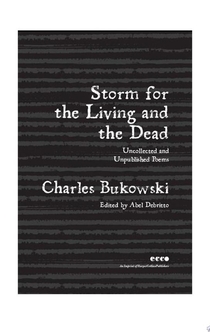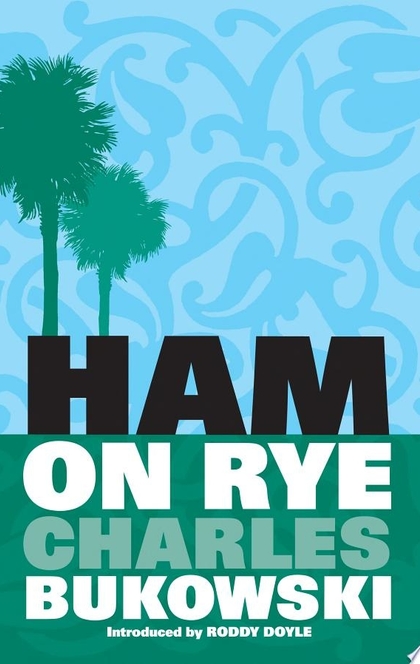
Living On Luck
Living on Luck is a collection of letters from the 1960s mixed in with poems and drawings. The ever clever Charles Bukowski fills the pages with his rough exterior and juicy center.

Storm for the Living and the Dead
A timeless selection of some of Charles Bukowski’s best unpublished and uncollected poems Charles Bukowski was a prolific writer who produced countless short stories, novels, and poems that have reached beyond their time and place to speak to generations of readers all over the world. Many of his poems remain little known since they appeared in small magazines but were never collected, and a large number of them have yet to be published. In Storm for the Living and the Dead, Abel Debritto has curated a collection of rare and never- before-seen material—poems from obscure, hard-to-find magazines, as well as from libraries and private collections all over the country. In doing so, Debritto has captured the essence of Bukowski’s inimitable poetic style—tough and hilarious but ringing with humanity. Storm for the Living and the Dead is a gift for any devotee of the Dirty Old Man of American letters.
See all

On Writing
Charles Bukowski's stories, poems, and novels have left an enduring mark on our culture. In this collection of correspondence--letters to publishers, editors, friends, and fellow writers--the writer shares his insights on the art of creation.

The Bell Tolls for No One
Previously uncollected pulp fiction by the 20th century American master. "The uncollected gutbucket ramblings of the grand dirty old man of Los Angeles letters have been gathered in this characteristically filthy, funny compilation ... Bukowkski's gift was a sense for the raunchy absurdity of life, his writing a grumble that might turn into a belly laugh or a racking cough but that always throbbed with vital energy."--Kirkus Reviews From the self-illustrated, unpublished work written in 1947 to hardboiled contributions to 1980s adult magazines, The Bells Tolls for No One presents the entire range of Bukowski's talent as a short story writer, from straight-up genre stories to postmodern blurring of fact and fiction. An informative introduction by editor David Stephen Calonne provides historical context for these seemingly scandalous and chaotic tales, revealing the hidden hand of the master at the top of his form. Born in Andernach, Germany, and raised in Los Angeles, Charles Bukowski published his first story when he was twenty-four and began writing poetry at the age of thirty-five. His first book of poetry was published in 1959; he would eventually publish more than forty-five books of poetry and prose. He died of leukemia in San Pedro, California on March 9, 1994. David Stephen Calonne is the author of several books and has edited three previous collections of the uncollected work of Charles Bukowski for City Lights: Absence of the Hero, Portions from a Wine-Stained Notebook, and More Notes of a Dirty Old Man.
See all

Screams from the Balcony
Screams from the Balcony is a collection of letters chronicling Charles Bukowski's life as he tries to get published and work at a postal office, all while drinking and gambling.

Portions From a Wine-Stained Notebook
Listen to a podcast of former San Francisco Poet Laureate Jack Hirschman and poet Neeli Cherkovski remembering life with the inimitable Charles Bukowski. Charles Bukowski (1920-1994), one of the most outrageous and controversial figures of 20th-century American literature, was so prolific that many important pieces were never collected during his lifetime. Portions is a substantial selection of these wide-ranging works, most of which have been unavailable since their original appearance in underground newspapers, literary journals, even porno mags. Among the highlights are his first published short story, "Aftermath of a Lengthy Rejection Slip"; his last short story, "The Other"; his first and last essays; and the first installment of his famous "Notes of a Dirty Old Man" column. The book contains meditations on his familiar themes (drinking, horse-racing, etc.) as well as singular discussions of such figures as Artaud, Pound, and the Rolling Stones. Other significant works include the experimental title piece; a fictionalized account of meeting his hero, John Fante ("I Meet the Master"); an unflinching review of Hemingway ("An Old Drunk Who Ran Out of Luck"); the intense, autobiographical "Dirty Old Man Confesses"; and several discussions of his aesthetics ("A Rambling Essay on Poetics and the Bleeding Life Written While Drinking a Six-Pack (Tall)," "In Defense of a Certain Type of Poetry, a Certain Type of Life, a Certain Type of Blood-Filled Creature Who Will Someday Die," and "Upon the Mathematics of the Breath and the Way", revealing an unexpectedly learned mind behind his seemingly offhand productions.Portions From a Wine-Stained Notebook is essential reading for Bukowski fans, as well as a good introduction for new readers of this innovative, unconventional writer.Praise for Portions From a Wine-Stained Notebook:"Finally, after Bukowski's nearly 50 published books: novels, short stories, poetry, letters, essays, etc. David Calonne has unearthed Portions From a Wine-Stained Notebook, the previously missing link in Bukowski's oeuvre that suddenly makes everything come clear."—John Martin, Black Sparrow Press"You know, I just think this is really hot. Among its many gifts, Portions from a Wine-Stained Notebook has one of the best lesbian sex scenes I ever read. I read Bukowski standing up one day in a bookstore (City Lights) and thought he did it too. What Henry Miller did. He wrote American. When it meant something good. Fucked up, male, but incredibly true. In a distinct rhythm."—Eileen Myles, author of Sorry, Tree and Cool for You"Bukowski wrote the way he lived, and Portions from a Wine-Stained Notebook is as vivid, bad-ass, screamingly funny, and gutter-angelic as the man himself. Reading these stories and essays, you can hear the beating heart of the poet in every line. Bukowski never wasted a word,and this collection should go far towards shining a light on prose in danger of being lost in the shadow of its larger-than-life author. Those new to his work will have the good fortune of discovering a writer who could break your heart, make you howl, and slap you off your bar-stool you in a single sentence. In a world long since gone lousy with faux hard-living typers and posers, he was the original."—Jerry Stahl, author of Permanent Midnight, Perv, Plainclothes Naked, and I, Fatty.Watch a clip from "Charles Bukowski Tapes" (1985) by Barbet Schroeder, where Bukowski takes a tour of Hollywood, pointing out his favorite spots:
See all

War All the Time
War All the Time is a selection of poetry from the early 1980s. Charles Bukowski shows that he is still as pure as ever but he has evolved into a slightly happier man that has found some fame and love. These poems show how he grapples with his past and future colliding.
See all

The Continual Condition
“The Walt Whitman of Los Angeles.”—Joyce Carol Oates “He brought everybody down to earth, even the angels.”—Leonard Cohen, songwriter Arguably the most imitated and influential American poet of the previous half-century, Charles Bukowski remains a counter-culture icon more than a decade after his death. The Continual Condition is a collection of never-before-published poems by the inimitable Bukowski—raw, tough, odes to alcohol, women, work, and despair by a rebel author equally adept at poetry and prose. Charles Bukowski lives on in The Continual Condition, a godsend for admirers of his previous collections Slouching Toward Nirvana, The Pleasures of the Damned, and Love is a Dog From Hell, as well as his novels Factotum, Ham on Rye, and Pulp.
See all

Mockingbird Wish Me Luck
Mockingbird Wish Me Luck captures glimpses of Charles Bukowski's view on life through his poignant poetry: the pain, the hate, the love, and the beauty. He writes of lechery and pain while finding still being able to find its beauty.

Dangling in the Tournefortia
There is not a wasted word in Dangling in the Tournefortia, a selection of poems full of wit, struggles, perception, and simplicity. Charles Bukowski writes of women, gambling and booze while his words remain honest and pure.

The Captain is Out to Lunch
A book length collaboration between two underground legends, Charles Bukowski and Robert Crumb. Bukowski's last journals candidly and humorously reveal the events in the writer's life as death draws inexorably nearer, thereby illuminating our own lives and natures, and to give new meaning to what was once only familiar. Crumb has illustrated the text with 12 full-page drawings and a portrait of Bukowski.
See all

Betting on the Muse
Betting on the Muse is a combination of hilarious poetry and stories. Charles Bukowski writes about the real life of a working man and all that comes with it.

The Roominghouse Madrigals
The Roominghouse Madrigals is a selection of poetry from Charles Bukowski's early work. It shows a slightly softer side to the beloved barfly.

Septuagenarian Stew
Septuagenarian Stew is a combination of poetry and stories written by Charles Bukowski that delve into the lives of different people on the backstreets of Los Angeles. He writes of the housewife, the bum, the gambler and the celebrity to evoke a portrait of Los Angeles
See all

Play the Piano
Play the Piano introduces Charles Bukowski's poetry from the 1970s. He leads a life full of gambling and booze but also finds love. These poems are full of lechery and romance as he struggles to mature.

The Days Run Away Like Wild Horses
The Days Run Away Like Wild Horses is a book of poems written by Charles Bukowski for Jane, his first love. These poems explore a more emotional side to Charles Bukowski.

sifting through the madness for the word, the line, the way
from "neither Shakespeare nor Mickey Spillane" young young young, only wanting the Word, going mad in the streets and in the bars, brutal fights, broken glass, crazy women screaming in your cheap room, you a familiar guest at the drunk tank, North Avenue 21, Lincoln Heights sifting through the madness for the Word, the line the way, hoping for a check from somewhere, dreaming of a letter from a great editor: "Chinaski, you don't know how long we've been waiting for you!" no chance at all.
See all

Slouching Toward Nirvana
in this place there are the dead, the deadly and the dying. there is the cross, the builders of the cross and the burners of the cross. the pattern of my life forms like a cheap shadow on the wall before me. my love what is left of it now must crawl to wherever it can crawl. the strongest know that death is final and the happiest are those gifted with the shortest journey.
See all

The Pleasures of the Damned
The Pleasures of the Damned is a selection of the best poetry from America's most iconic and imitated poet, Charles Bukowski. Celebrating the full range of the poet's extraordinary sensibility and his uncompromising linguistic brilliance, these poems cover a lifetime of experience, from his renegade early work to never-before-collected poems penned during the final days before his death. Selected by John Martin, Bukowski's long-time editor and the publisher of the legendary Black Sparrow Press, this stands as what Martin calls 'the best of the best of Bukowski'.
See all

What Matters Most is How Well You
This second posthumous collection from Charles Bukowski takes readers deep into the raw, wild vein of writing that extends from the early 70s to the 1990s.

The People Look Like Flowers At Last
“if you read this after I am deadIt means I made it”-“The Creation Coffin”The People Look like Flowers at Last is the last of five collections of never-before published poetry from the late great Dirty Old Man, Charles Bukowski. In it, he speaks on topics ranging from horse racing to military elephants, lost love to the fear of death. He writes extensively about writing, and about talking to people about writers such as Camus, Hemingway, and Stein. He writes about war and fatherhood and cats and women.Free from the pressure to present a consistent persona, these poems present less of an aggressively disruptive character, and more a world-weary and empathetic person.
See all

Hot Water Music
With his characteristic raw and minimalist style, Charles Bukowski takes us on a walk through his side of town in Hot Water Music. He gives us little vignettes of depravity and lasciviousness, bite sized pieces of what is both beautiful and grotesque.The stories in Hot Water Music dash around the worst parts of town – a motel room stinking of sick, a decrepit apartment housing a perpetually arguing couple, a bar tended by a skeleton – and depict the darkest parts of human existence. Bukowski talks simply and profoundly about the underbelly of the working class without raising judgement. In the way he writes about sex, relationships, writing, and inebriation, Bukowski sets the bar for irreverent art – his work inhabits the basest part of the mind and the most extreme absurdity of the everyday.
See all









Comments